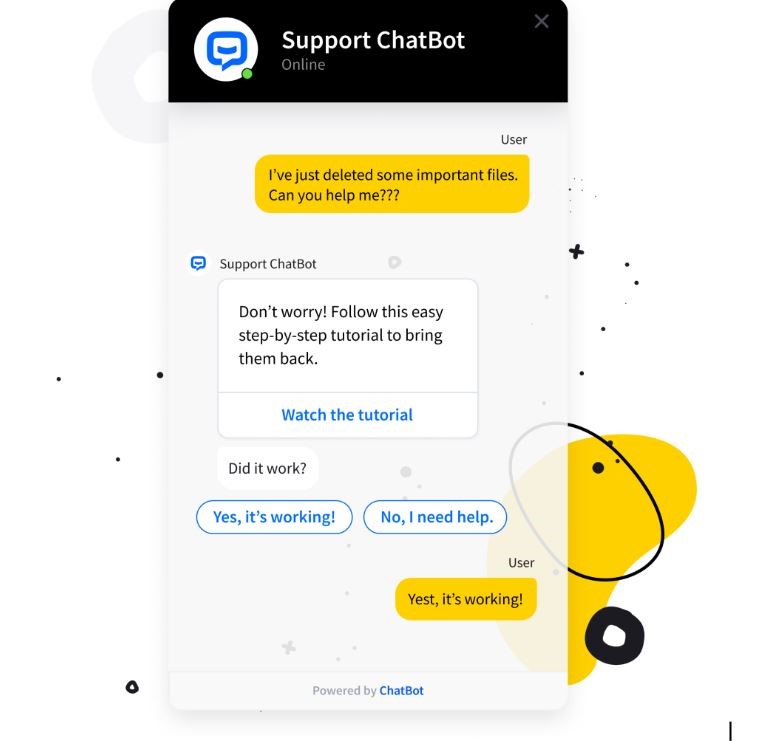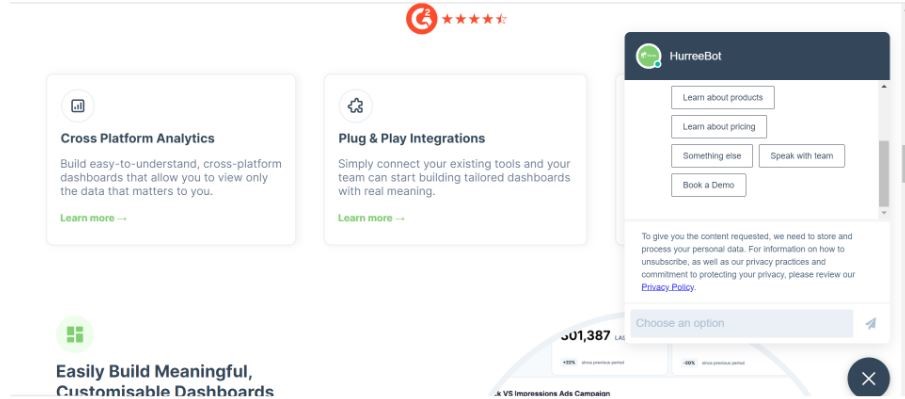AI and Automation: How Will They Influence the E-Commerce Landscape?
- September 13, 2023
- 8 mins read
- Listen

Table of Content
Artificial intelligence (AI) technology has been integrated into consumer experiences worldwide, with smart, data-driven features available in E-commerce websites and in-app shopping forums.
2024 statistics reveal that businesses using AI tools for digital commerce can expect more than 25% improvement in customer satisfaction, cost reduction, and revenue. Experts predict this will contribute about $15.7 trillion to the global economy by 2030.
So, if you’re related to the E-commerce industry and its content marketing, you must know about AI and automation and how they can be harnessed to get better results.
How AI and Automation Integrated into E-Commerce
E-commerce is an ever-growing market. Forbes estimates that 24% of all retail purchases will occur online by 2026. E-commerce buyers have crossed 200 million and are expected to grow steadily in the coming years.
AI in E-commerce- In 2022 and onwards, due to a reduction in in-person shopping AI has been in the limelight to provide an immersive online shopping experience. Several AI tools were adopted to revolutionize online shopping and how content is consumed in the E-commerce industry. One such example is ChatGPT.
Sellers on E-commerce giants like Walmart and Amazon use ChatGPT to generate product listings, including product titles, descriptions, bullet points, etc. By using the right prompt, ChatGPT can provide unique and personalized content. Integrating this AI tool into E-commerce websites can improve sales, customer support, and ROI. It also reduces response times and boosts productivity.

In this era of personalization, there are two facets to using technology for E-commerce. AI and automation tools are transforming both: the way businesses operate and the way customers shop. They enable everything, from customer-personalized product recommendations to streamlining order fulfillment for supply chain operations.
A significant part of AI-powered shopping experiences comes from data-driven customer insights. AI can analyze a customer’s shopping history, browsing patterns, and past preferences to curate a relevant shopping experience. These insights help businesses in targeting customers effectively and also ensure customers get exposed to relevant content, not spam.
Both AI and automation work wonders in stepping up the E-commerce game for buyers and sellers. But before we delve into how it’s done, let’s understand the difference between AI and automation and their different applications.
Is Automation the Same as AI? – A Mythbuste
Imagine you have a response set for customers who try to contact you outside your working hours. It can be something like, “Oops, we’re on a break now. Thanks for reaching out, though! Please reach us any time between Monday to Thursday, 9.00 AM to 7 PM.”
This message goes out to anyone who tries to text or email you when you’re off, irrespective of their issue. That’s automation!
On the other hand, you have an intelligent chat assistant to address customer queries. It is like a messaging platform where customers get relevant text replies. Here’s an example:

In this instance, the chat assistant responds based on what the customer is asking. This is artificial intelligence!
Often, business owners need clarification on automation and AI in E-commerce. These two terms are not interchangeable and must be understood distinctly for more informed investments.
Automation is when you set up automatic tasks based on predefined rules. If the rules or criteria are fulfilled, a specific response is generated, or a task is performed. AI, on the other hand, is an automated function that is capable of making its own decisions based on human input.
It emulates human thinking and can interact with customers in multiple ways without following predefined codes or conditions. In fact, AI assistants like Alexa or Google can understand and analyze human speech and respond with answers or solutions.
Here’s how AI and automation compare:
|
Automation |
AI |
|
Rules or parameters drive it. |
It is capable of making up responses on its own. |
|
Its responses are limited to predefined conditions. |
It can have a variety of responses based on user data, machine learning, and natural language processing. |
|
It reduces manual workload and reduces error margins. |
It gives you a human alternative to reach customers. |
|
Its results are less variable. |
It can have variable responses to specific situations. |
|
An example can be automated emails for marketing. |
An example can be intelligent route planning for shipment delivery. |
In E-commerce, automation can streamline tasks related to manufacturing, distribution, marketing, transaction, website access, shipping, etc. AI takes this one step further by aiding in brand growth, analyzing customers through ML, providing actionable insights, and applying historical data to decision-making.
AI capabilities for E-commerce are still evolving, as you read. So, in the near future, AI and automation are expected to do wonders for the E-commerce landscape. Both companies and customers are set to benefit hugely from this technological boom.
How AI and Automation Are Influencing the E-Commerce Sector
A Blumberg Capital study states that 50% of consumers are optimistic about using AI for online shopping. A Salesforce study also revealed that 62% of consumers are willing to use AI to improve their customer experience.
With consumers embracing AI technology wholeheartedly, businesses have also stepped forward in integrating automated systems into their workflow.
AI and automation provide a much-needed understanding of customer demographics, including what they want, what they buy, and what bothers them. This technology also helps businesses reach their target audience easily and quickly. AI platforms automate consumer interactions, leading to better problem-solving without overly pressuring human agents.
Here’s how automation and AI in E-commerce contribute to better performance and business expansion.
Omnichannel Marketing
In omnichannel retail, AI can personalize and optimize customer experience across multiple platforms. It unifies data across channels and analyzes them to deliver insights for marketing campaigns, channel optimization, etc.
You can predict which channels perform well, reach customers more effectively and automate repetitive tasks. AI enables end-to-end personalization through natural language generation, NLP, ML, and computer vision. This leads to customized recommendations, automated support, and a seamless shopping experience.
For example, you spot a business on Instagram. You can message them on the platform, make a purchase, complete payment, and reach out for updates without switching between the website, phone call, social media, and physical store.
Conversational Marketing
This concept applies to chatbots, instant messaging, SMS marketing, and other text channels. When you visit a website, you often get a pop-up from an automated assistant asking what you are interested in.

Screenshot from source
When you select an option, you are directed to relevant content. This is a part of conversational marketing through AI.
Its goal is to engage website visitors, help them explore your offerings, and convert them into customers. It can also retarget existing customers for upsell and cross-sell opportunities.
Chatbots are a crucial element of conversational marketing. These AI-powered assistants can enable quicker engagement, resolve simple queries, provide practical recommendations, and process orders based on customer instructions. This is super helpful for customer service teams, which are then free to focus on the company’s growth.
Relationship Management
The best way to raise brand awareness and build an audience is to build consumer relationships. Customer loyalty brings you higher ROI, less churn, and steady revenue. AI and automation technologies can drive conversions online by efficiently managing customer and influencer relationships.
Rather than hiring a marketing team, you can use an AI tool for social listening and gathering relevant user-generated content. Campaigns based on user inputs are more likely to resonate with your audience. You can also repurpose user content from customers and influencers with AI for better marketing performance.
Smart Search
Searching patterns have evolved over the years. Voice search has changed how keywords are used. So, the targeted keywords on your website must also accommodate these searches.
For instance, if you visit a website and use the search bar, you’ll enter something like “Bluetooth earphones for Android.” Instead, shopping through a voice assistant makes you more likely to say, “Which Bluetooth earphones work best for Android phones?”
This is where smart search makes a difference. AI’s intuitive and predictive mechanism provides the best results in contextual searches. Customers get better results and are more likely to choose from the provided products. This helps businesses get conversions and reduces search time and errors for consumers.
Customer Advocacy
Customer advocacy is putting customer needs on top and delivering solutions that aim toward customer satisfaction. AI contributes tremendously to customer advocacy as it helps businesses understand their customer base.
For example, AI algorithms can optimize product offerings, pricing strategies, and marketing content for more customer-centered messaging. By analyzing interactions and buying patterns, businesses can identify user pain points and fix them to boost profitability.
AI and automation have a combined influence on the present and future of E-commerce. It all started with automated messaging and has now evolved into multiple advanced features, such as:
- Voice assistants
- AI content generation
- Conversational chatbots
- Recommendation engines
- Auto-generated product descriptions
- Personalized search
- Mobile shopping
- Image tagging and recognition
- Virtual personal shoppers
- AR and VR (immersive shopping)
- Enhanced delivery systems, and much more.
Technology and online commerce collaboration will only uplift the E-commerce industry by enhancing sales and marketing strategies. Using innovative technology, businesses can streamline their workflows, boost efficiency, and improve customer satisfaction scores.
Both marketers and consumers can benefit from AI in E-commerce. It’s time to join the bandwagon of AI and automation to turn all your online shopping expectations into reality!
